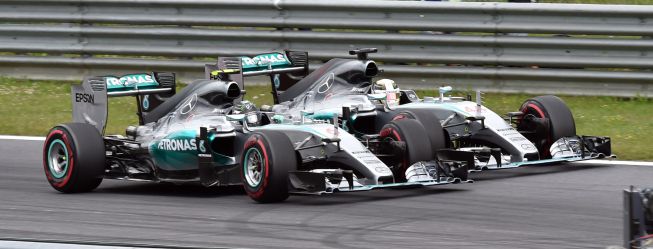Engines in Formula 1: Ecclestone’s Criticism
"These engines are stupid, in fact, they are the stupidest thing that has happened to Formula 1. They are not even engines, they have batteries, hybrid systems and other things." This is how hard and blunt Bernie Ecclestone showed himself in a conversation with Verstappen at the Austrian GP, which days later became public, and which adds to other furious attacks by the British billionaire on the V6 Turbo engines that have transferred the dictatorship from Vettel and Red Bull to Mercedes and their duo of drivers, Hamilton and Rosberg: "They don't help F-1 in any way. Neither the spectacle nor the teams finding sponsors and investment."
The Engine is the Key
Obviously, the engine alone does not tyrannize F-1, but the German team itself acknowledged some time ago that it was the key: "We asked the FIA about things regarding the new rules that no one questioned back then, and we started working. That's the reason our engine is performing so well, which has an impact on the whole car. We were surprised to see that other teams didn't jump on the same bandwagon."
An Almost Insulting Domination
A dominance that looks more like a supersonic plane if we analyze the cold statistics. Since the current power units replaced the V8 engines at the beginning of the last season, 28 races have been disputed, 19 in 2014 and nine in this year's Championship. And the dominance is almost insulting: 24 victories, 27 poles, 49 podiums (out of 56 possible), and leading 86.3% of the laps raced (1,466 out of 1,698). Of course, adding the driver's titles (Hamilton) and constructors' championship from last season, and more than likely the two from this current championship. And the feeling that beyond the talent of their pair of drivers, it is the car and its engine that are far above the rest of the competitors.
The Call for Change
The debate is more open than ever and changes are being demanded from all areas to level the competition and revitalize F-1. Many former drivers, in particular, demand that the driver regains the main role in the races. This is why since the Belgian GP (August 23rd), the FIA announced modifications that will affect, among other things, the control of the car by the driver at the starts. Currently, the clutch and throttle are manually controlled, but the team receives information via radio about the ideal torque to avoid wheel-spin, the best clutch placement, or the updated tire temperature.
The Impact of the Changes
The two title contenders have evaluated this specific measure. "It's a good thing. It will be even more exciting and everything will be in our hands, which will make it more difficult to do it perfectly. It will greatly increase the number of variables and make it more difficult to predict the outcome of the start," says a positive Rosberg.
Hamilton, the reigning champion and current leader with a 17-point advantage over his German teammate, also sees it as an important change that will undoubtedly affect the development of the races. And the British driver explains it for the less knowledgeable: "When you're on the grid, the team can calculate the amount of grip on the asphalt and the amount of power delivery the engine needs to avoid having too much and wheel-spinning, or too little and getting a slow start. The team tells you to increase or decrease that torque, but now we won't be able to do it, so there will be a lot of drivers who will have bad starts."

